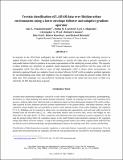Terrain classification of LADAR data over Haitian urban environments using a lower envelope follower and adaptive gradient operator
Author(s)
Neuenschwander, Amy L.; Magruder, Lori A.; Crawford, Melba M.; Weed, Christopher A.; Fried, Dale G.; Knowlton, Robert C.; Heinrichs, Richard M.; Cannata, Richard; ... Show more Show less
DownloadNeuen-2010-Terrain classification of LADAR data over Haitian urban environments using a lower envelope follower and adaptive gradient operator.pdf (1.878Mb)
PUBLISHER_POLICY
Publisher Policy
Article is made available in accordance with the publisher's policy and may be subject to US copyright law. Please refer to the publisher's site for terms of use.
Terms of use
Metadata
Show full item recordAbstract
In response to the 2010 Haiti earthquake, the ALIRT ladar system was tasked with collecting surveys to support disaster relief efforts. Standard methodologies to classify the ladar data as ground, vegetation, or man-made features failed to produce an accurate representation of the underlying terrain surface. The majority of these methods rely primarily on gradient- based operations that often perform well for areas with low topographic relief, but often fail in areas of high topographic relief or dense urban environments. An alternative approach based on a adaptive lower envelope follower (ALEF) with an adaptive gradient operation for accommodating local slope and roughness was investigated for recovering the ground surface from the ladar data. This technique was successful for classifying terrain in the urban and rural areas of Haiti over which the ALIRT data had been acquired.
Date issued
2010-04Department
Lincoln LaboratoryJournal
Proceedings of SPIE--the International Society for Optical Engineering
Publisher
SPIE
Citation
Amy L. Neuenschwander, Melba M. Crawford, Lori A. Magruder, Christopher A. Weed, Richard Cannata, Dale Fried, Robert Knowlton and Richard Heinrichs, "Terrain classification of ladar data over Haitian urban environments using a lower envelope follower and adaptive gradient operator", Proc. SPIE 7684, 768408 (2010); doi:10.1117/12.866033
Version: Final published version
ISSN
0277-786X